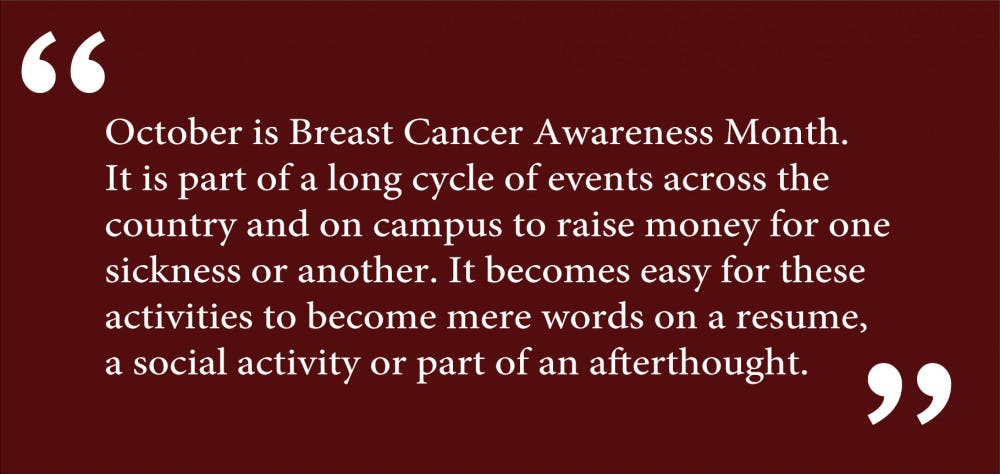My mother has breast cancer. It takes a lot for me to write that.
It was caught early. The timeline, as it often does in times of trauma, flashes in bits and pieces. I remember whispered conversations in the shoe aisles of thrift stores. There are the hushed phone calls, the second opinions and the blood tests. My family, filled with experienced and knowledgeable doctors, sitting silently in a room with nothing to say. She had surgery as I flew back to campus this semester, and her chemotherapy will continue on through Thanksgiving, Christmas and the next year.
“Cancer, the emperor of all maladies,” writes Siddhartha Mukherjee in his 2011 Pulitzer Prize-winning book. It is an insidious disease, thriving in the shadows and recurring out of the blue. It can hide in the prostate and emerge in the brain or the lungs. It kills, often tragically and painfully. And, as researchers are currently studying, its causes can be passed down from generation to generation.
My grandmother had breast cancer. Her husband, my grandfather, died of cancer. For families like mine, with patterns of recurrence, the standard protocol is genetic testing. And so, last month, my mother deposited another sample of blood and the fear of cancer entered another person’s chapter: mine.
As students and young adults, we often think in terms of immortality. We might complain about exams or the pace of classes, but most of us view life as demarcated by years, even decades, rather than months or weeks. Very few of us are unlucky enough to become preoccupied with death — our own and others’. But trust me, many students are. Society may celebrate the causes célèbres, such as Lady Gaga coming out with fibromyalgia or Selena Gomez getting a kidney transplant for her Lupus. Hell, Julia Louis-Dreyfus just came out with her own breast cancer diagnosis and used it to advocate for accessible national healthcare. But a good majority of health issues impact people, including people on campus, who aren’t afforded that kind of exposure.
Cancer and disease in general are often talked about in whispers, with shame or a sort of pity. At least for my family, it’s something we kept within closed walls, as a private matter. Even then, my mom didn’t tell me about her diagnosis for weeks. But I think that all sickness, physical or mental, thrives on isolation and secrecy. And I’ve learned in the worst possible way that it’s not enough to talk about these things — we have to actually engage with them.
October is Breast Cancer Awareness Month. It is part of a long cycle of events across the country and on campus to raise money for one sickness or another. Brown Football Bench Press for Cancer. Relay for Life. It is very easy to fall into this pattern of participation, where you take part in a challenge for five minutes, raise some money and move on with your life. I know I have done this in the past: Anybody remember the Ice Bucket Challenge? Do we still remember what we raised money for? It becomes easy for these activities to become mere words on a resume, a social activity or part of an afterthought. But we should take the time to Google search Lawrence Rubida ’05, a Brown football player whose death led to the first Bench Press for Cancer. We should follow up with students on medical leave, because these are the people who are directly impacted. We shouldn’t forget them.
Sickness is ubiquitous in society, but how we deal with disease varies immensely. Communities in college are unique because they completely turn over their populations in four years. Trends can rise and fall and things can be forgotten, no matter how much they mattered once upon a time. But the momentum we gain for disease awareness should not lose energy at the end of the month, or the end of the academic year or even after our time at Brown. We cannot overlook the individuals in our own communities who face illness even after the awareness month, the bench presses and the video challenges end.
Every year, I shop ANTH 0300: “Culture and Health,” and every year I have to drop it because it doesn’t fit in with my schedule. I’ve kept the syllabus, nevertheless, and have slowly made my way through the reading list on my own time. There is a graphic novel, “Cancer Vixen,” about a hip, fashionable New Yorker who survived breast cancer; she is supported by her own mother, her fiancé and a nearly endless list of friends. She fights, she suffers and she ultimately survives. Her story offers a visceral look on what it really means to be affected by sickness. I often wondered why the class is asked to read such a narrative in the first few weeks of the course. But after giving a copy to my mom, I think I know.
Mark Liang ’19 can be reached at mark_liang@brown.edu. Please send responses to this opinion to letters@browndailyherald.com and other op-eds to opinions@browndailyherald.com.





